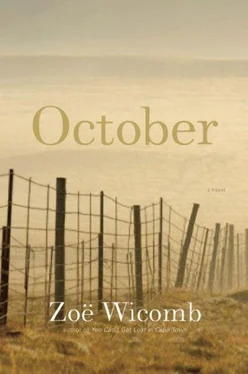Why were the nasty chores reserved for her? It was also she, Mercia, who had to empty the chamber pots, and if she can barely remember her mother, Nettie’s inspection of the pots on Saturdays remains indelible. A daily rinse was not enough. Once a week the enamel pots had to be scrubbed with sand to ensure that no unhygienic deposits adhered, and all before rubber gloves had found their way to Kliprand. Grown-ups were exempt from these demeaning tasks, and so was her brother. Mercia knew that questioning her lot would achieve nothing more than a stinging smack — such was the nasty world of grown-ups. Had her own mother not rebelled as a child? And if she had, why was she repeating the practice? Not only would Mercia never give her own child such tasks; she knew from an early age that she would rather have no children to bully. Mercia never traveled without rubber gloves in her suitcase, just in case something nasty had to be handled.
Then, as she watched her father steeped in borrowed nostalgia, stumbling about the village of Nettie’s childhood, affectionately recollecting the hardships of their early marriage, Mercia felt a rush of sympathy for their ineptitude as parents. She could hear Jake’s cynical reprimand, that it was in her own interest to believe that the old folk did what they did because they believed it to be for the best, to be in their children’s interest. How could you buy that shit? he asked scornfully.
Mercia does not understand why Jake has hardened his heart, why he seems angrier than ever. Surely people grow more relaxed about their parents’ faults as they grow older. After all, Nicholas and Nettie would have been damaged in turn by the weird beliefs of an earlier generation.
Mercia can no longer think kindly of Jake. He is a monster, not the nice brother of the novel at all.
Nicky says that he is not tired, that he does not want a nap as his mother has ordered. Could they not instead go for a walk and explore? Mercia smiles at him, pleased that he wants to be with her, or rather, she amends, pleased that he wants to go out. If it turns out that she’ll have to take Nicky to Glasgow. . no, there’ll be a way out; she must not allow herself to be bullied into anything like that. All the same, she is pleased to take the boy out for a walk. Besides, she can see no reason why a child should sleep if he is not tired. But wary of repercussions she says that if he lies down quietly for fifteen minutes, they’ll go for a short walk. It will be cooler then. She makes another condition. They will speak English for the entire walk. She has ascertained that the boy understands well enough. What he needs is to practice speaking. Nicky looks uncertain; he doesn’t think that he’ll manage for such a long time. Perhaps, he suggests, they could speak one language on the way there and another on the way back. That would help Auntie Mercy with her Afrikaans. Mercia laughs, It’s a deal.
Settled on the uncomfortable sofa, Nicky falls asleep instantly, and wakes up half an hour later, still raring to go. With the help of a tossed coin, English chooses itself as the language for the outbound walk. Nicky hopes that they’ll go to the cave, or find more caves with chincherinchee in the mountain.
Is such conservatism typical of children? Do they all want to do the same things over and over again when the wide world of newness is waiting to be explored? Mercia startles herself with the thought that that will have to be beaten out of the boy, which, of course, is no more than an idiomatic expression, nothing to do with physical assault, but it pains her all the same to have thought in such terms.
No, she says, it’s too dull to do the same things. Let’s explore other places, see what crops up.
They set off across the field where the sheep graze, toward a disused road where Mercia remembers lorries bumping along the gravel with their cargoes of gypsum from now-defunct mines. The mountains are too far, although they could drive there another time, she promises, but today they have to be back before his mother gets home. Yes, says the child, she will worry about him being taken by the troll.
Nicky’s English is better than he thinks, although Mercia has to supply several words and also at times correct the Afrikaans pronunciations, but the concentration slows down his chatter. He promises to learn some from his father when he gets better; he knows that you can’t be clever without English. Mercia explains that it is simply good to know more than one language, that it allows you to talk to different kinds of people, and living as he does in South Africa he should also learn Xhosa. Perhaps they already teach it at school? she wonders aloud, but Nicky says he hopes not, and rushes ahead chanting to himself. Christ, there is no question of her being able to stand in for a parent. Not only the formidable task of raising a child, but also, there is so much for him to unlearn.
They stop to look at ants’ nests, track the ambitious insects struggling with impossible loads that seem beyond their means. But no, there appears to be always a way out as by hook or by crook the desired object is eventually dragged down into the excavated earth. Mercia, ever the teacher, has to stop herself from offering the behavior of ants as a homily. Nicky, with unbridled enthusiasm, is detained by all kinds of things, his pockets stuffed with stones, a dead insect’s carapace that he says looks like a Volkswagen, various leaves. Why? Why? Why? he asks continuously, and she wonders how parents have the energy or patience with so much talking, so much explanation of a world that barely makes sense to her. The responsibility is oppressive. If only she could turn back, announce that she’s had enough, for she is assailed by alarming heat, wave after wave of hot flashes that leave her breathless. When the heat subsides, she realizes that the child has taken her hand, that he has stopped talking. But it takes no more than a wan smile from her for the barrage of questions to resume.
Mercia is unable to identify all the flora; she could swear that these plants did not exist when she was a child. Together they marvel at leaf structures, at thorns and succulents. There is an extraordinary single green leaf that grows directly, without a stalk, out of the ground on which it lies flattened. Why, he asks, will it not sit up nicely like the fresh green of sorrel that is now bursting into flower?
Mercia doesn’t know, distracts him with the flowering sorrel that she had to gather as a child for making soup; she encourages him to chew at the long sour stalks packed with vitamin C. Nicky is enthralled by the history lesson on the Dutch sailors who, on their way to procuring Eastern spices, stopped at the Cape to cure their scurvy with sorrel. He likes the word scurvy, rolls the R extravagantly and chuckles — to him it sounds like a swearword. She explains that scurvy led the Dutch to gardening and refreshing themselves at the Cape, that it could be seen as the root of all the country’s troubles. Nicky the parrot repeats after her: the root of all our country’s troubles.
Mercia is surprised that the boy knows nothing of the fields of multicolored daisies that cover the land at the beginning of spring, only a few miles farther north, in the heart of Namaqualand. But Nicky does not think that sounds so good. Much more exciting to find things that are hidden, see what crops up, he echoes, and off he scampers, giving himself a break from the exhausting English.
Yissus, he screams, gou, kom kyk, then corrects himself hurriedly to repeat in English. Mercia catches up and laughs to find that he is excited about a tortoise. It could hardly run away, she exclaims. Has he not seen a tortoise before? Oh yes, but he has never found one himself. They keep still so that the tortoise sticks out its ugly head and swivels its eyes about before withdrawing, this time tucking all away, head, legs and tail, so that it is dead still, pretending to be a stone in the sand. They admire the shell with its border of black and yellow triangles arranged around the twelve hexagons, themselves marked in black and a deeper yellow. Mercia thinks that the age can be told from the markings, but she can’t be sure. The child wonders if it is a female and whether its babies might be nearby, kept hidden in the shade of a bush. He would search for them, see what their markings are like.
Читать дальше












